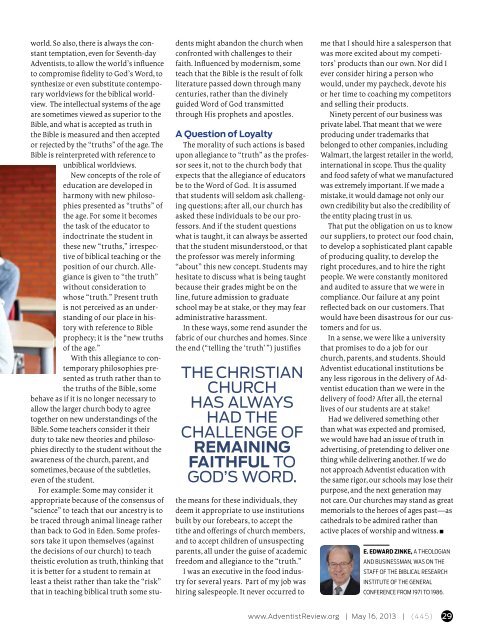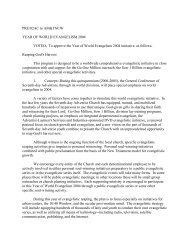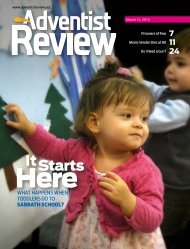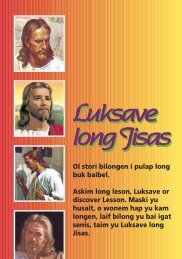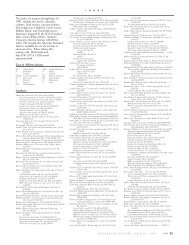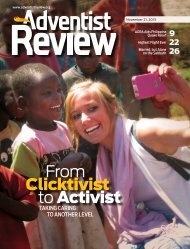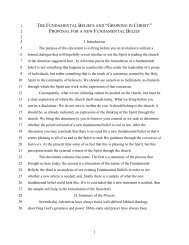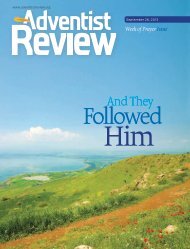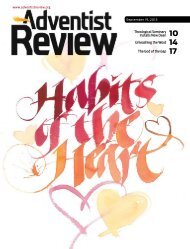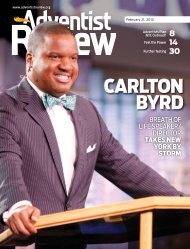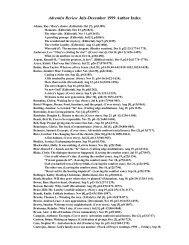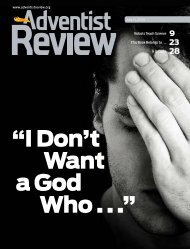Christ Kona?
Download PDF - Adventist Review
Download PDF - Adventist Review
- No tags were found...
Create successful ePaper yourself
Turn your PDF publications into a flip-book with our unique Google optimized e-Paper software.
world. So also, there is always the constant<br />
temptation, even for Seventh-day<br />
Adventists, to allow the world’s influence<br />
to compromise fidelity to God’s Word, to<br />
synthesize or even substitute contemporary<br />
worldviews for the biblical worldview.<br />
The intellectual systems of the age<br />
are sometimes viewed as superior to the<br />
Bible, and what is accepted as truth in<br />
the Bible is measured and then accepted<br />
or rejected by the “truths” of the age. The<br />
Bible is reinterpreted with reference to<br />
unbiblical worldviews.<br />
New concepts of the role of<br />
education are developed in<br />
harmony with new philosophies<br />
presented as “truths” of<br />
the age. For some it becomes<br />
the task of the educator to<br />
indoctrinate the student in<br />
these new “truths,” irrespective<br />
of biblical teaching or the<br />
position of our church. Allegiance<br />
is given to “the truth”<br />
without consideration to<br />
whose “truth.” Present truth<br />
is not perceived as an understanding<br />
of our place in history<br />
with reference to Bible<br />
prophecy; it is the “new truths<br />
of the age.”<br />
With this allegiance to contemporary<br />
philosophies presented<br />
as truth rather than to<br />
the truths of the Bible, some<br />
behave as if it is no longer necessary to<br />
allow the larger church body to agree<br />
together on new understandings of the<br />
Bible. Some teachers consider it their<br />
duty to take new theories and philosophies<br />
directly to the student without the<br />
awareness of the church, parent, and<br />
sometimes, because of the subtleties,<br />
even of the student.<br />
For example: Some may consider it<br />
appropriate because of the consensus of<br />
“science” to teach that our ancestry is to<br />
be traced through animal lineage rather<br />
than back to God in Eden. Some professors<br />
take it upon themselves (against<br />
the decisions of our church) to teach<br />
theistic evolution as truth, thinking that<br />
it is better for a student to remain at<br />
least a theist rather than take the “risk”<br />
that in teaching biblical truth some students<br />
might abandon the church when<br />
confronted with challenges to their<br />
faith. Influenced by modernism, some<br />
teach that the Bible is the result of folk<br />
literature passed down through many<br />
centuries, rather than the divinely<br />
guided Word of God transmitted<br />
through His prophets and apostles.<br />
A Question of Loyalty<br />
The morality of such actions is based<br />
upon allegiance to “truth” as the professor<br />
sees it, not to the church body that<br />
expects that the allegiance of educators<br />
be to the Word of God. It is assumed<br />
that students will seldom ask challenging<br />
questions; after all, our church has<br />
asked these individuals to be our professors.<br />
And if the student questions<br />
what is taught, it can always be asserted<br />
that the student misunderstood, or that<br />
the professor was merely informing<br />
“about” this new concept. Students may<br />
hesitate to discuss what is being taught<br />
because their grades might be on the<br />
line, future admission to graduate<br />
school may be at stake, or they may fear<br />
administrative harassment.<br />
In these ways, some rend asunder the<br />
fabric of our churches and homes. Since<br />
the end (“telling the ‘truth’ ”) justifies<br />
The <strong>Christ</strong>ian<br />
church<br />
has always<br />
had the<br />
challenge of<br />
remaining<br />
faithful to<br />
God’s Word.<br />
the means for these individuals, they<br />
deem it appropriate to use institutions<br />
built by our forebears, to accept the<br />
tithe and offerings of church members,<br />
and to accept children of unsuspecting<br />
parents, all under the guise of academic<br />
freedom and allegiance to the “truth.”<br />
I was an executive in the food industry<br />
for several years. Part of my job was<br />
hiring salespeople. It never occurred to<br />
me that I should hire a salesperson that<br />
was more excited about my competitors’<br />
products than our own. Nor did I<br />
ever consider hiring a person who<br />
would, under my paycheck, devote his<br />
or her time to coaching my competitors<br />
and selling their products.<br />
Ninety percent of our business was<br />
private label. That meant that we were<br />
producing under trademarks that<br />
belonged to other companies, including<br />
Walmart, the largest retailer in the world,<br />
international in scope. Thus the quality<br />
and food safety of what we manufactured<br />
was extremely important. If we made a<br />
mistake, it would damage not only our<br />
own credibility but also the credibility of<br />
the entity placing trust in us.<br />
That put the obligation on us to know<br />
our suppliers, to protect our food chain,<br />
to develop a sophisticated plant capable<br />
of producing quality, to develop the<br />
right procedures, and to hire the right<br />
people. We were constantly monitored<br />
and audited to assure that we were in<br />
compliance. Our failure at any point<br />
reflected back on our customers. That<br />
would have been disastrous for our customers<br />
and for us.<br />
In a sense, we were like a university<br />
that promises to do a job for our<br />
church, parents, and students. Should<br />
Adventist educational institutions be<br />
any less rigorous in the delivery of Adventist<br />
education than we were in the<br />
delivery of food? After all, the eternal<br />
lives of our students are at stake!<br />
Had we delivered something other<br />
than what was expected and promised,<br />
we would have had an issue of truth in<br />
advertising, of pretending to deliver one<br />
thing while delivering another. If we do<br />
not approach Adventist education with<br />
the same rigor, our schools may lose their<br />
purpose, and the next generation may<br />
not care. Our churches may stand as great<br />
memorials to the heroes of ages past—as<br />
cathedrals to be admired rather than<br />
active places of worship and witness. n<br />
E. Edward Zinke, a theologian<br />
and businessman, was on the<br />
staff of the Biblical Research<br />
Institute of the General<br />
Conference from 1971 to 1986.<br />
www.AdventistReview.org | May 16, 2013 | (445) 29


